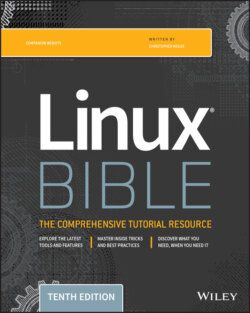Читать книгу Linux Bible - Christopher Negus - Страница 164
Finding files by user
ОглавлениеYou can search for a particular owner (-user) or group (-group) when you try to find files. By using -not and -or, you can refine your search for files associated with specific users and groups, as you can see in the following examples:
$ find /home -user chris -ls 131077 4 -rw-r--r-- 1 chris chris 379 Jun 29 2014 ./.bashrc # find /home \( -user chris -or -user joe \) -ls 131077 4 -rw-r--r-- 1 chris chris 379 Jun 29 2014 ./.bashrc 181022 4 -rw-r--r-- 1 joe joe 379 Jun 15 2014 ./.bashrc # find /etc -group ntp -ls 131438 4 drwxrwsr-x 3 root ntp 4096 Mar 9 22:16 /etc/ntp # find /var/spool -not -user root -ls 262100 0 -rw-rw---- 1 rpc mail 0 Jan 27 2014 /var/spool/mail/rpc 278504 0 -rw-rw---- 1 joe mail 0 Apr 3 2014 /var/spool/mail/joe 261230 0 -rw-rw---- 1 bill mail 0 Dec 18 14:17 /var/spool/mail/bill 277373 2848 -rw-rw---- 1 chris mail 8284 Mar 15 2014 /var/spool/mail/chris
The first example outputs a long listing of all of the files under the /home directory that are owned by the user chris. The next lists files owned by chris or joe. The find command of /etc turns up all files that have ntp as their primary group assignment. The last example shows all files under /var/spool that are not owned by root. You can see files owned by other users in the sample output.
